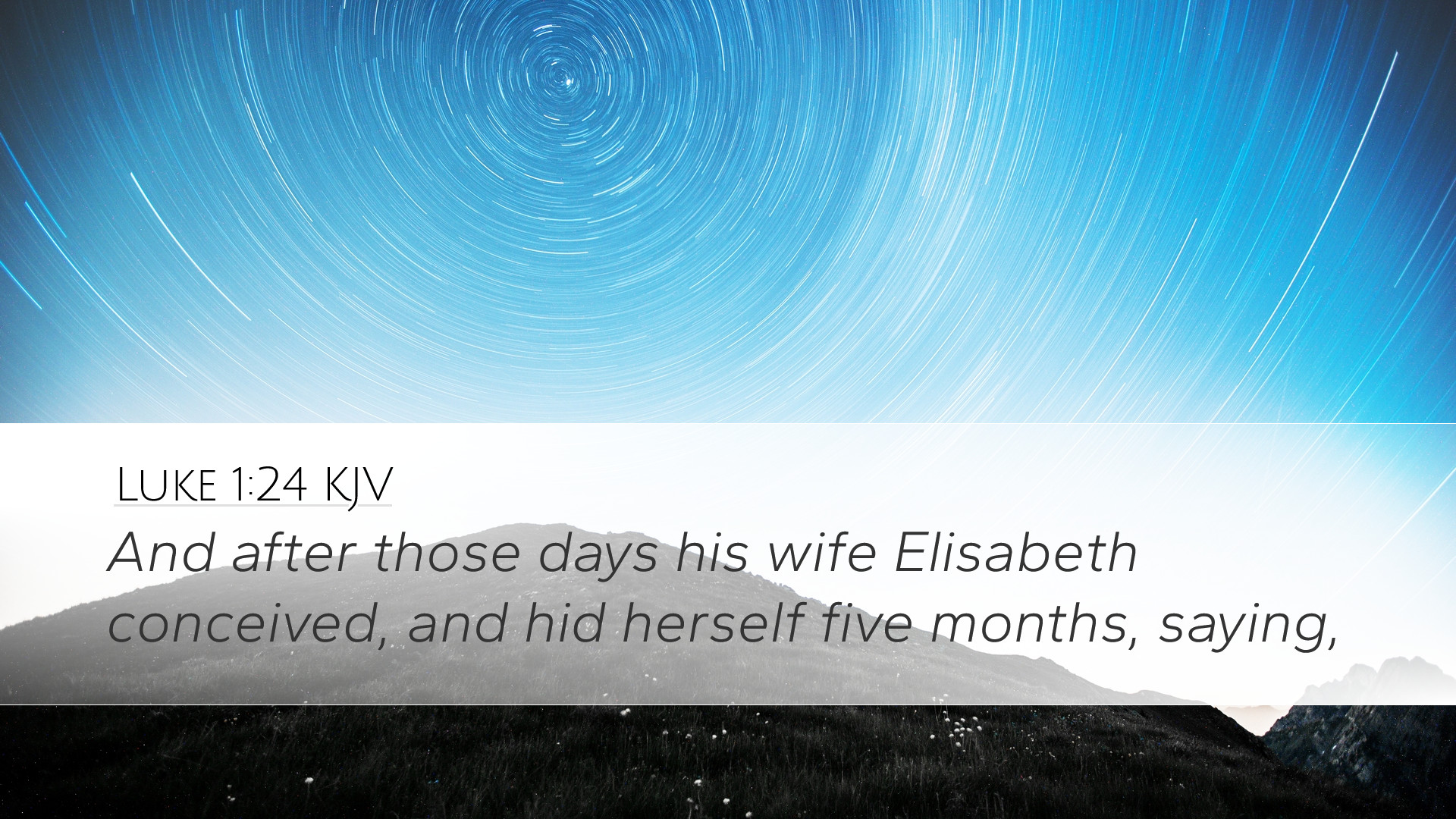Luke 1:24 Commentary
Verse: "And after those days his wife Elisabeth conceived, and hid herself five months, saying,
Introduction
The account of Elizabeth's conception in Luke 1:24 marks the beginning of an extraordinary narrative in the Gospel of Luke. This verse provides insight into the lives of Zechariah and Elizabeth, revealing both the challenges and the divine interventions they experienced. Such narratives are essential for understanding the broader themes of faith and divine purpose in the lives of individuals chosen by God.
Contextual Insights
Before diving into the verse, it is crucial to consider the immediate context. Elizabeth and Zechariah, as described in the preceding verses, were righteous before God but childless, a condition that brought them societal shame in their time. Elizabeth's subsequent pregnancy is thus a significant turning point, representing not only personal hope but also a link to the messianic prophecy fulfilled in the birth of John the Baptist.
Matthew Henry's Perspective
According to Matthew Henry, this event signifies the goodness of God in answering the prayers of the faithful, even when it seems that the appointed time has long passed. His commentary emphasizes that Elizabeth's long period of barrenness laid the groundwork for her son, John, to be acknowledged as a miracle. Henry also points out that Elizabeth's desire to hide her pregnancy is reflective of her humility and perhaps the uncertainty that such a miraculous event might bring.
Albert Barnes' Commentary
Albert Barnes highlights the miraculous nature of Elisabeth's conception, providing an emphatic view on God's intervention in fulfilling His promises. He notes that the pregnancy is particularly miraculous due to Elizabeth's old age, which emphasizes God’s sovereignty over circumstances. Barnes further recognizes that Elizabeth's hiding for five months might indicate her sensitivity to the divine circumstances surrounding her pregnancy. This act of seclusion can be seen as a time of reflection and preparation for the child that was to come.
Adam Clarke's Interpretation
Adam Clarke adds depth to our understanding by focusing on the cultural implications of Elizabeth's actions. He notes that hiding her pregnancy may have been an attempt to protect herself from skepticism and potential ridicule from society. Clarke argues that Elizabeth's reluctance to reveal her state was likely a combination of joy, disbelief, and the desire to come to terms with the divine favor she had received. He emphasizes an understanding of the joy that accompanies divine blessings, while also confronting the challenges that these blessings may bring.
Theological Implications
This verse has several theological implications that are crucial for pastoral and scholarly reflection:
- Divine Timing: The account of Elizabeth’s conception highlights God's perfect timing in the unfolding of His redemptive plan, as displayed in both the Old Testament and the New Testament.
- Miraculous Conception: The conception of John the Baptist is a miracle attributed to God, underscoring the belief that God is able to intervene in human affairs in extraordinary ways.
- Faithfulness Rewarded: Elizabeth and Zechariah's faithfulness is rewarded, which serves to inspire believers regarding the importance of persistence in prayer and faith in divine purposes.
- The Role of Secrecy: Elizabeth's choice to hide her pregnancy invites a reflection on how believers may are called to manage their blessings and the revelations of God in their lives.
Applications for Pastoral Ministry
For pastors and ministry leaders, the insights from Luke 1:24 serve as an essential resource for homiletics and pastoral care. Here are some applications:
- Encouragement for the Barrenness: Just as Elizabeth waited and was eventually blessed, those in ministry can offer hope to individuals struggling with their own issues of barrenness—be it spiritual, emotional, or relational.
- Highlighting God’s Sovereignty: When preaching this text, it is vital to articulate the magnificence of God's sovereignty in human affairs and His ability to bring life and hope where none seems possible.
- Emphasizing Seclusion for Reflection: The value of solitude can be a powerful lesson. Encouraging moments of prayerful reflection and seclusion can strengthen one's spiritual life, similar to Elizabeth’s hidden period before the birth of John.
- Celebration of God’s Miracles: This passage can serve as a celebration of God’s miraculous works. Testimonies of God’s faithfulness can bolster the faith of congregations and emphasize a culture of gratitude.
Conclusion
Luke 1:24, as observed through the insights of Matthew Henry, Albert Barnes, and Adam Clarke, provides rich material for understanding the nature of God's interventions in human life. The experiences of Elizabeth serve as a source of hope and affirmation of faith for believers striving under their own burdens and waiting for God's promises to unfold. Through contemplation of these themes, pastors, students, theologians, and scholars can gain broader perspectives on divine providence and its implications in their ministries and studies.


